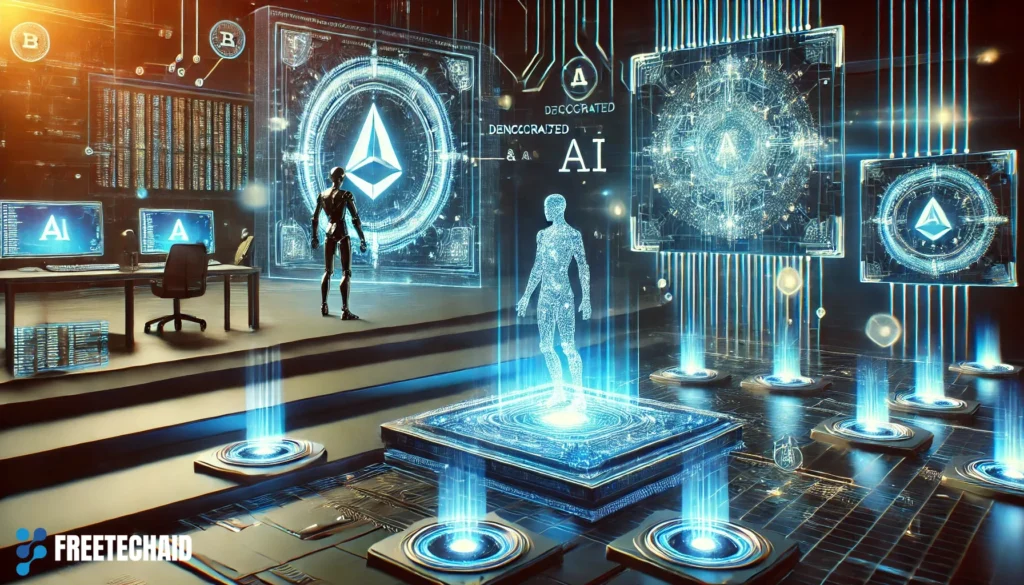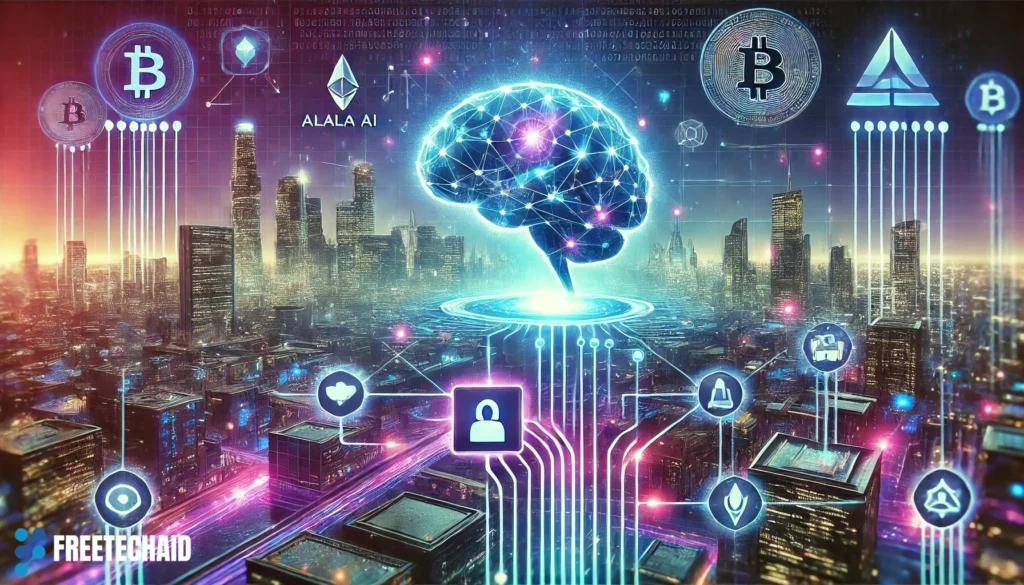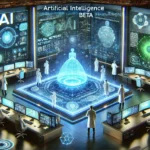Introduction
Progress in data technology is on the rise due to the integration of blockchain technology Alaya AI. In the contemporary world, the use of Alaya AI is redefining the processes of collection, management and utility of data into a synthesized intelligence-powered framework. This increases the accuracy and availability of data and works toward improving the decision-making processes in multiple industries. This article examines the impact of Blockchain Technology Alaya AI in data solutions and the foresight of technology advancement.
Understanding Blockchain Technology
What is Blockchain?
Blockchain is a decentralized digital ledger (DLT) that tracks transactions across many computers. The system ensures data integrity by recording an event. Once recorded, no changes can be deleted or altered later!
Key Features of Blockchain Technology
- Decentralization: Blockchain systems utilize autonomous technology without an authoritative central government to oversee them.
- Transparency: Blockchain transactions can be scrutinized transparently to verify they are honest and precise, providing parties with greater peace of mind that each is valid and trustworthy.
- Security: Modern cryptography techniques provide security to blockchain data against fraudulent activities and unwarranted access, protecting it against fraudulent behavior and unwanted access attempts.
- Immutability: Once an event is recorded, there is no way of changing or amending it, ensuring greater data accuracy and increasing information accuracy.
Blockchain technology has revolutionized many sectors, ranging from finance and healthcare to AI-powered data services, producing positive change throughout many fields of activity.
Introduction to Alaya AI
What is Alaya AI?
Alaya AI is an AI-driven platform that uses blockchain technology to provide safe and reliable information solutions. It boosts AI capabilities using blockchain’s decentralized computing capabilities and security features.
Role of Alaya AI in Data Solutions
- Secure Data Sharing: Assures data privacy and protects it in AI data transfer.
- Decentralized AI Processing: Lowers dependence on central AI processes, which makes operations more effective.
- Trustless AI Interactions: Utilizes smart contracts to automate tasks driven by AI without the need for intermediaries.
Bringing AI in blockchain with AI, Alaya AI creates an effective synergy between blockchain and AI, improving the data security and processing security of Alaya AI.

How Enhance the Blockchain Technology Alaya AI
Blockchain and artificial Intelligence represent two revolutionary innovations of modern computing. Combined, they create an ecosystem characterized by security, efficiency, and decentralization that thrives Alaya AI’s integration into Alaya Blockchain proves positive. We will explore how Alaya improves through Blockchain integration in this article.
Security and Data Integrity
Immutability and Tamper-Proof Data Processing
One of AI’s most significant problems today is ensuring the information it processes is secure, unchanged, and reliable. Blockchain technology solves this issue in that it makes data irrevocable. After data has been recorded on the blockchain, it cannot be deleted or changed.
That means the AI-driven decisions based upon Blockchain-based data are more secure since the data is in place and undamaged. Particularly in healthcare and finance, where precision is essential, Blockchain integration will ensure that AI models operate with validated, authentic, reliable information.
Preventing Data Manipulation and Fraud
When using centralized AI models, unauthorized individuals could alter data, leading to inaccurate AI forecasts or fraudulent activity. When AI applications are built using blockchain networks such as Alaya AI, every piece of data is secure through the cryptographic hashing process and consensus mechanisms.
In finance, AI-powered fraudulent detection systems rely upon transactional information. Blockchain ensures that the data can’t be altered, making detecting fraud much more exact.
AI models analyzing patient medical records require unaltered patient data to provide accurate diagnoses. Blockchain assures that patient information remains true.
Decentralization in AI Processing
Reducing Centralized Vulnerabilities
Conventional AIs maintain data in centralized servers, serving as their weakest link and single point of failure. Should an attacker gain entry through one of these devices, sensitive data would be up for grabs, and to make things worse, machine learning models might be altered, and confidential materials could be placed into open access.
Blockchain can eliminate this concern by distributing the data and AI computations among several nodes. If one of the nodes is affected, the whole network is secure and can ensure continuous AI processes.
Trustless AI Operations
Centralized AI environments impose on their users the reliance on third parties for managing information and AI processes, but blockchain can remove this dependency through secure AI processing. Alaya AI takes advantage of blockchain’s decentralized nature by employing decentralized algorithms that operate transparently to reduce intermediary requirements and eliminate intermediary roles.
For example, in Supply Chain Management, forecasting models powered by AI can run on blockchains to give accurate forecasts of demand without the need for a central authority to validate the accuracy of the data.

Read More Article: Top 10 Universities for a PhD in Artificial Intelligence | 2025 Guide
Real-World Applications of Blockchain Technology and Alaya AI
Finance: Enhancing Fraud Detection and Risk Management
Financial institutions depend on AI to identify suspicious transactions and determine the risk. However, conventional AI models often face problems with incorrect or altered information. With blockchain technology, the financial information is unchangeable, which allows AI models to use safe, unaltered data.
In addition, blockchain-based smart contracts will automate the process of preventing fraud. If AI detects suspicious activities or activity, it could trigger the smart contract to block accounts or alert authorities immediately.
Healthcare: Securing Patient Records and AI Diagnostics
Medical AI programs analyze patient data to detect diseases, suggest treatment options, and anticipate the risk of illness. When patient data is altered or destroyed, AI-powered healthcare applications become ineffective. Blockchain assures that the medical records remain intact and are accessible only to those who have been authorized.
Examples:
- AI-powered drug discovery may utilize blockchain technology to store clinical trial data securely.
- AI diagnostic tools can scour blockchain-validated patient records to make accurate recommendations.
Supply Chain: Improving Transparency and Efficiency in Logistics
AI improves logistics by anticipating delays, managing inventory, and reducing expenses. But, supply chain information is usually broken up and altered. Blockchain ensures that logistics data is reliable and accessible in real-time.
As an example:
- AI models predicting shipment delays can use real-time blockchain updates.
- Smart contracts will automatically approve transactions when AI confirms delivery.
Smart Cities
Smart cities are utilizing Blockchain technology Alaya AI to manage data collected from various sources, including traffic sensors, energy grids, and even security systems for public safety. Blockchain guarantees data security as AI analyses the data to improve city operations and enhance the quality of life.
Benefits of Blockchain Technology Alaya AI
Blockchain technology is integral to Alaya AI and provides several advantages that include the following benefits:
- Increased data security: Blockchain’s distributed, immutable design ensures that information remains safe.
- Improved accuracy: AI algorithms can process and analyze data more precisely, thus decreasing errors and improving decision-making processes.
- More Transparency: Blockchain is a secure and auditable record of transactions. It also increases the level of trust and accountability.
- Real-time insights: AI enables real-time data analysis that allows businesses to react quickly to changes in circumstances.
- Cost Efficiency: Alaya AI’s blockchain technology reduces operational costs by cutting out intermediaries and automating procedures.
Improving Data Privacy and Security
Secure Data Sharing through Blockchain and AI
Unlike traditional AI systems which keep their data in easily hackable centralized databases, platforms like Alaya AI use blockchain technology to ensure secure and private sharing.
Examples:
- Healthcare AI applications allow for the analysis of medical records without divulging patient’s identities.
- Financial AI models can determine creditworthiness without disclosing your personal information.
Encryption and Access Control
Blockchain is a way to secure cryptographic data, which ensures that AI systems are only able to have access to data when they are granted permission. The users are in charge of their data, allowing AI to secure the processing without risk of unauthorized disclosure.
Smart Contracts and AI: A Powerful Combination
Automating processes using AI and Blockchain
What Are Smart Contracts?
Working entirely autonomously, smart contracts execute self-service functions, are recorded on a blockchain, and automate the execution of functionalities by enforcing contract agreements without any third party.
When paired with AI, Smart contracts, ts can become much more effective, allowing the automation of various sectors.
Use Cases of Smart Contracts in AI-Driven Applications
Automated Financial Transactions
Risk analysis based on AI can trigger smart contracts that approve or deny transactions based on the risk score when an AI algorithm detects fraud and can automatically run smart contracts to stop the deal.
Decentralized AI Training
Machine learning models demand a considerable amount of training data. Smart contracts are a great way to facilitate the decentralization of AI training while ensuring the exchange of information in a fair manner between AI creators and data suppliers.
How Decentralized Storage Improves AI Efficiency
AI applications rely on massive databases, typically stored in central cloud servers. However, central storage can cause problems, causing processing delays and security risks.
The decentralized storage networks, fueled by blockchain technology, boost AI effectiveness by:
- Reducing data retrieval time.
- Increased availability of data across many nodes.
- Ensuring data security and protection from cyber-attacks.
Challenges of Integrating Blockchain Technology Alaya AI
Scalability Issues
The acceleration of transactions and the speed of data storage often block the currency networks. While AI technology requires fast data processing, the speed of confirmation of blockchain transactions might be a bottleneck. However, solutions like scaling and Layer 2 Sharding are developing to mitigate this issue.
Energy Consumption Concerns
Blockchain’s proof-of-work mechanism uses much power, making it less suitable forn AI applications. Alternative consensus mechanisms, such as proof of stake, are being studied to decrease energy usage.
Future of Blockchain Technology Alaya AI
Predictions for AI and Blockchain Synergy
Integrating AI and blockchain is expected to keep pushing security, automation, and efficiency advancements. Experts have predicted:
- AI powered, decentralized applications (dApps) will be more widespread.
- Blockchain can be used as the foundation of AI-driven decisions.
Potential Industries to Benefit
- Healthcare: Safe AI-driven diagnostics and the discovery of new drugs.
- E-commerce: Individualized AI-driven suggestions using blockchain security.
- Finance: Prevention of fraud and control of risk using blockchain-powered AI analytics.
Conclusion
Blockchain technology Alaya AI transforms data solutions that increase security, privacy, and effectiveness. Blockchain guarantees that AI-driven data processing is reliable and unchangeable as it uses blockchain’s decentralization to reduce inefficiencies. When technology and blockchain develop, health, finance, and supply chain management industries will experience unprecedented improvements, making the digital technology world more secure and innovative.
FAQs
Q1. What can blockchain do to enhance AI security?
Blockchain makes sure that data generated by AI is secured and tamper proof by utilizing the encryption method and also decentralization.
Q2. Blockchain technology can assist AI to become more effective?
Blockchain is a good option, as it allows AI models to tap into non centralized computing resources, which can help reduce bottlenecks and increase processing speed.
Q3. What are the primary uses that are the main uses of Alaya AI?
Alaya AI is utilized in the fields of healthcare, finance as well as supply chain management, to boost the security and efficiency of data.
Q4. Is Blockchain Technology Alaya AI a decentralized platform?
Indeed, Alaya AI leverages blockchain’s distributed network to guarantee safe and effective AI processes.
Q5. Which industries could benefit from blockchain technology Alaya AI integration?
Industries like finance, healthcare, ecommerce, and cybersecurity could greatly profit from blockchain technology and AI integration.



